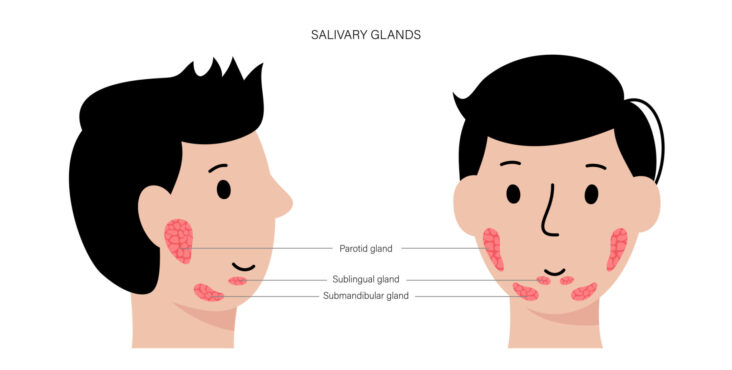What are Salivary Glands?
Salivary glands are found in the mouth. Three pairs of big salivary glands exist:
- Parotid glands are located just in front and below each ear.
- Submandibular glands are located under the jaw.
- The sublingual glands are located beneath the tongue.
Hundreds of tiny glands are also present in the mouth. These glands produce saliva (spit) and release it into the mouth through ducts. Saliva moistens food, making it easier to chew and swallow, as well as aiding digestion. Saliva contains antibodies that destroy pathogens, and thus, it keeps the mouth clean and healthy. When the salivary glands are destroyed or don’t produce enough saliva, it can impact taste, make chewing and swallowing difficult, and raise the risk of cavities, tooth loss, and infections in the mouth.
What are the causes of Salivary Gland Disorders?
The most typical problems develop when the ducts of the salivary gland get blocked, and the saliva cannot drain. The causes of the problems in the glands may include:
- Infection – The glands become infected when saliva collects behind an obstruction in a duct. When an infection is caused due to a sore throat or cold, it can lead to a secondary infection in the salivary glands.
- Obstruction – In the glands, small stones are formed, which can obstruct the flow of the saliva. This causes the gland to swell and become painful and infected.
- Tumours – Normally, tumours present themselves as painless enlargements of one of the salivary glands. Malignant (cancerous) tumours can grow quickly, be painful or not, and cause loss of movement on the affected side of the face.
- Other Disorders – Salivary glands can get swollen and painful because of auto-immune disorders such as Sjögren’s syndrome and Rheumatoid arthritis and diseases like HIV and AIDS.
What are the Symptoms of Salivary Gland Disorders?
Problems with salivary glands can make them irritated and swollen. The symptoms of Salivary gland disorders may include:
- Trouble opening the mouth
- Bad taste in the mouth
- Dry mouth
- Pain in the face or mouth
- Swelling on the face or neck
- Blocked saliva flow
- Difficulty in eating
- Swelling if the cheek and neck glands
- Pain in the gland(s)
- Repeated infections
- Growths or lumps inside the glands or neck
How are Salivary Gland Disorders Treated?
Salivary disorders are treated using medical or surgical treatments, according to the problems that are causing them. If a systemic disease (a sickness that affects the entire body) is the cause of the salivary disorder, that problem is treated first. This may require a consultation with a professional. If the problem is caused by a salivary gland obstruction, then the doctor may use a local anaesthetic to numb the area, so they can probe and widen the duct to remove the obstructing stone.
If the doctor detects a tumour, then they may suggest its removal. An
otolaryngologist
(also known as an ear, nose, and throat doctor) may be referred for surgery. The majority of tumours in the parotid gland are benign (noncancerous). If a tumour is found to be cancerous, then it will be surgically removed, and the surrounding area will be treated with radiation therapy.


One Comment
Pingback: Salivary Gland Disorders – Sujata Birla Hospital